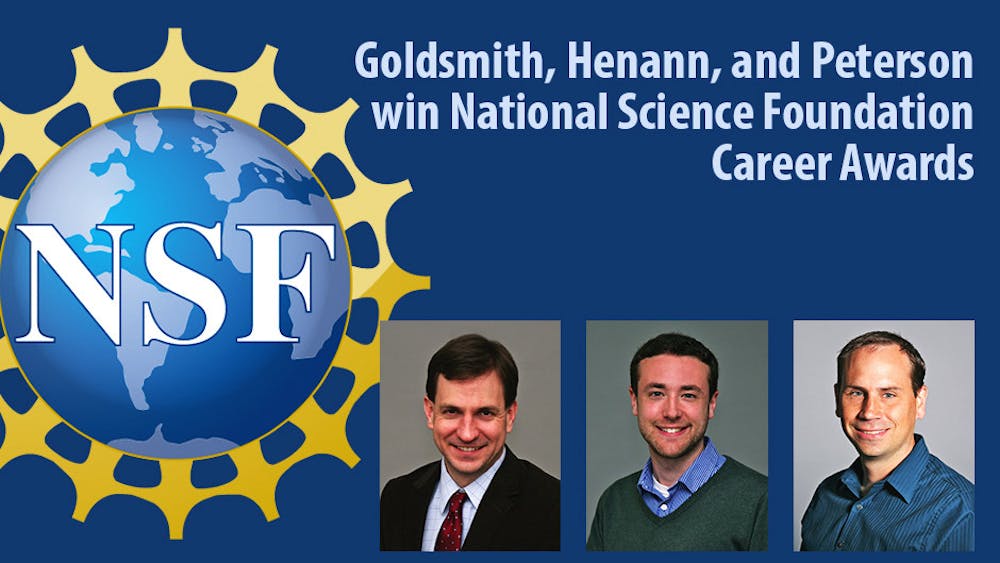Three junior faculty members in the School of Engineering have received the National Science Foundation’s CAREER Awards of approximately $500,000 over the course of five years. Franklin Goldsmith, David Henann and Andrew Peterson, all assistant professors of engineering, will join the nearly one third of current University faculty members in the School of Engineering who have won the award.
Founded in 1995, the program provides promising junior faculty members the opportunity to pursue “outstanding research, excellent education and the integration of education and research within the context of the mission of their organizations,” according to the NSF website. To apply for the award, junior faculty members completed 15-page original research project proposals in July that specifically laid out the plans for their next five years of research and included the goals and broader impacts of the project in the context of a 30-year career, Goldsmith said.
“It has to be the A-plus paper — otherwise there’s no point in writing it,” Peterson said, referring to the high selectivity of the award, which was open to all untenured faculty members from all around the country.
Goldsmith’s proposal centered on the question: “If you could have any fuel, what should that fuel be? What is the ideal transportation fuel?” To answer this question, Goldsmith researches “the connection between the molecular structure of a fuel molecule and how it behaves in an engine” in the hopes of developing cleaner, more efficient fuels for transportation.
Goldsmith hopes to use his new funding to improve the efficiency of internal combustion engines by creating a transition fuel that will “buy time until a more sustainable technology emerges,” he said. “I think the global climate change and how we generate energy is going to be one of the most critical problems in the 21st century,” Goldsmith added.
Peterson also received his award for his research oriented around fuel cells. He focused on combining research from computer science and quantum mechanics to describe proton transfers and surface reactions that will help scientists better understand clean energy storage and conversion, he said.
Described as “half theoretical work and half experimental,” Peterson’s research aims to “understand these reactions that take place in solar fuels and in fuel cells” by atomically constructing a simulation of the material on a computer and predicting the reactions that will take place, he said.
Henann won his award for research on creating predictive models and mathematical descriptions for the movement and deformation of granule materials such as sand and powder, he said. Granules “behave differently than other types of matter” because they have unique capabilities of acting as a solid, liquid or gas. Their unpredictability makes it hard for pharmaceutical companies and those in other industries to understand their movement and engineer manufacturing processes around them, Hennan said.
Current models are limited because they fail to express the unique real-world circumstances, such as different grain sizes in granule materials and their tendency to sort themselves by size when subjected to a force, Hennan said. Given the confusion about granules, his research is a “natural problem to go into,” Hennan said. “It has the potential to be able to make a big contribution both intellectually and with some sort of useful engineering tool,” he added.
The award-winning professors each plan to use the $500,000 grant to pay graduate students to assist them on their research.
“To be able to take one student and shepherd him or her through their entire graduate time on a single grant on what I consider an important topic is great,” Goldsmith said.
“The research topics we do are always so specific that they almost get to be esoteric to someone who doesn’t specialize in them,” Peterson said regarding the confusion and specificity of the engineering projects researched by professors. But the flexibility and visibility that the award provides give the researchers “a little extra space to explore ideas that will hopefully jump off into additional fruitful projects,” Hennan said.





